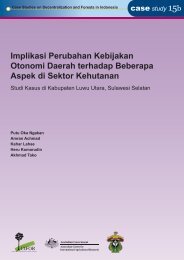Adaptive collaborative management of community forests in Asia ...
Adaptive collaborative management of community forests in Asia ...
Adaptive collaborative management of community forests in Asia ...
You also want an ePaper? Increase the reach of your titles
YUMPU automatically turns print PDFs into web optimized ePapers that Google loves.
Chapter 2: <strong>Adaptive</strong> Collaborative Management: A Conceptual Model • 39<br />
Box 2-6. Mach<strong>in</strong>e metaphor for post<strong>in</strong>dustrial organisations<br />
Management theorist Senge (1990) concludes that the mach<strong>in</strong>e metaphor for<br />
organisational development is so powerful that it has shaped the character<br />
<strong>of</strong> most organisations. Organisations become more like mach<strong>in</strong>es than liv<strong>in</strong>g<br />
be<strong>in</strong>gs because their members th<strong>in</strong>k <strong>of</strong> them that way, and that expla<strong>in</strong>s why<br />
a <strong>management</strong> style guided by the mach<strong>in</strong>e metaphor will have problems with<br />
organisational change. The need to have all changes designed by <strong>management</strong><br />
and imposed upon the organisation tends to generate bureaucratic rigidity.<br />
There is no room for flexible adaptations, learn<strong>in</strong>g and evolution. One related<br />
aspect <strong>of</strong> this, as Capra (2002) po<strong>in</strong>ts out, is that emergent solutions are<br />
created with<strong>in</strong> the context <strong>of</strong> a particular organisational culture and generally<br />
cannot be transferred to another organisation with a different culture. This<br />
tends to be a big problem for leaders who are keen on replicat<strong>in</strong>g successful<br />
organisational change: they tend to replicate a new structure that has been<br />
successful without transferr<strong>in</strong>g the tacit knowledge and context <strong>of</strong> mean<strong>in</strong>g<br />
from which the new structure emerged. This can lead to very mechanistic<br />
forms <strong>of</strong> organisation.<br />
In possibly one <strong>of</strong> the best analyses <strong>of</strong> the mach<strong>in</strong>e metaphor (although he<br />
does not use the term) as it applies to states, Scott (1998) has po<strong>in</strong>ted out<br />
the dangers <strong>of</strong> such an approach, which can become dom<strong>in</strong>ant under four<br />
conditions:<br />
• An adm<strong>in</strong>istrative order<strong>in</strong>g <strong>of</strong> nature and society <strong>in</strong> grand attempts<br />
at transformative state simplifications. States, he contends, dislike the<br />
natural complexity <strong>of</strong> ecosystems and social systems, because they<br />
cannot deal with it us<strong>in</strong>g their usual forms <strong>of</strong> organisation.<br />
• ‘High modernism’, which he def<strong>in</strong>es as an ideology that borrows<br />
legitimacy from the sciences and technology and as a result is<br />
uncritical, unsceptical and unscientifically optimistic. Examples<br />
<strong>in</strong>clude big river projects and social eng<strong>in</strong>eer<strong>in</strong>g.<br />
• An authoritative state that has a capacity to act <strong>in</strong> the ways listed<br />
above.<br />
• A powerless civil society that provides ‘the level social terra<strong>in</strong>’ on<br />
which to build.<br />
Scott’s observations apply equally well to a great many <strong>of</strong> the small <strong>community</strong><br />
development projects we see <strong>in</strong> our rural landscapes. Scott notes that ‘workto-rule’<br />
protests effectively hamstr<strong>in</strong>g a state, <strong>in</strong>dustry or organisation precisely<br />
because the rules <strong>in</strong> themselves are never sufficient to make someth<strong>in</strong>g work.<br />
Local knowledge, contracts and relationships allow an organisation to live and<br />
are what make the difference.
















